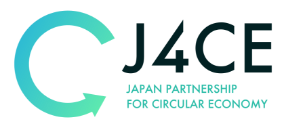Quality Control of Recycled Plastic
[Company / organization] Veolia Japan GK
Implementation
February 2015
Business Model
One of the issues which has been raised in plastic recycling business for some time is that the quality of recycled material does not meet the standard defined by clients.If strength and functionality of recycled plastic could be retained through quality improvement, the applications for such material could be expanded and its demand would increase.
At Veolia’s Ibaraki plant, we blend, compound and pelletize 31 types of post-consumer and pre-consumer plastic material and produce over 10 types of recycled plastic products.QR codes are used in the process to manage stocks, provide manufacturing instructions, and control the quality of recycled plastic which tends to be unstable.
Specific procedures are as follows:
1. QR code generation: Before arrival of feedstock, information on type of feedstock, number of flexible containers and weight is provided and entered into QR code.Tags are then issued.
2. Storage of inventory: A QR code tag is attached to each flexible container, and the containers are stored as inventory.
3. Blending design: For each production lot, instruction regarding the type and volume of feedstock is given in order to meet the quality standard of recycled plastic products.
4. Production: Upon receiving the instruction, QR code is checked to select feedstock, which is injected into production line for blending and compounding.
5. Inventory management: Amount of inventory can be identified by registering in the QR code the volume that has been used.
These measures would allow the inventory to be managed with accuracy and prevent mistakes in selecting and injecting feedstock.Quality inspection is conducted prior to shipping.Even if some abnormality is detected then, the cause can be identified effectively as we would know what type of feedstock was used with QR code log.This initiative would allow the quality of recycled plastic to be stabilized and, as a result, we could expect that the credibility of the plastic recycling industry would enhance as a whole.
Track Record and Future Perspective
About 10,000 tons of recycled plastic is produced and sold annually at Ibaraki plant which are mainly used for plastic pallets, containers, wood decks, photo frames, parts of electric products, rainwater storage facilities and imitation trunks.
In order to leverage the knowhow on quality control described above and aim to mass produce high-quality recycled plastic, PLANIC Co.,Ltd. has jointly been established by Toyota Tsusho Corporation, Kojima Sangyo Co.,Ltd. and Veolia Japan GK.Planic’s factory will be Japan’s largest recycling plastic processing site which will target to supply 25,000 tons per year. Planic also intends to enhance its competitiveness by taking advantage of economies of scale and maintaining the price of recycled products lower than resin products made of virgin material.
- Recycle
- End-of-use
- Plastics
- Individual company
- Company in different category.
- Currently under implementation (already in business)
- Case/initiative by individual company



